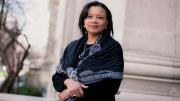For Tomiko Brown-Nagin, Paul professor of constitutional law and professor of history, spending a year conducting research as a Radcliffe Institute fellow during the academic year 2016-2017, when she was newly arrived at Harvard, was a unique opportunity to marry her research interests. “I am a profoundly interdisciplinary scholar,” she says. “I study law and history, and it can often be difficult to move between two distinct scholarly worlds—I certainly have felt that throughout my career. When I got to Radcliffe, it felt like home. It felt comfortable.”
In July, Brown-Nagin moved into the dean’s office at Fay House, and has since been using her new position to emphasize Radcliffe’s role as a place for members of the Harvard community to convene and collaborate with one another. Her efforts include continuing to enlarge the Radcliffe Research Partnership Program, which enables undergraduates to work with Radcliffe Institute fellows on their projects in the arts, sciences, public policy, and humanities. The program “is invaluable to the undergraduate population because it gives the students the chance to see Harvard in a more intimate setting, which is what they long for,” she says. “The students here really want to have engagement with professors and fellows in a smaller setting.” In the same vein, she is also pursuing opportunities for local high-school students to convene at Radcliffe and be mentored by undergraduates with similar academic interests.
Turning to the institute’s flagship fellowship program, Brown-Nagin says that even as she welcomes humanists, artists, and social scientists to apply, she also hopes that scholars interested in applied research in fields like medicine and public health will consider the Radcliffe residency a particularly attractive option. “I look forward to making it clear that we are a part of the world, and we are engaged with the world. Students and faculty who are predisposed in that matter have a home at Radcliffe.”
While assuming the deanship, Brown-Nagin continues her academic affiliations with both the Law School and the Faculty of Arts and Sciences. “I really enjoy being a mentor to students, and I am continuing with graduate-student advisees,” she says. “I am also teaching a 1L reading group, and I’m really, really happy that I decided to do that. I wasn’t sure if I should, because I was a little nervous about continuing to teach in the first semester of my deanship, but it’s just so rewarding.”
Atop those demands of a packed work schedule, her first months as dean have been made busier by major campus-renewal projects. The Schlesinger Library on the History of Women in America, the preeminent collection in its field, is closed through early September 2019 as it is renovated and reconfigured—a project that will add classrooms, an updated reading room, and a gallery space. (Researchers can still access the library’s collections, by appointment, in a temporary reading room in Fay House.) And the Knafel Center, Radcliffe’s main space for public lectures (a significant element of its programming), was renovated this past summer; it now incorporates user-friendly technological updates and additional classroom space.
During her own fellowship, Brown-Nagin worked on her forthcoming book on the life of Constance Baker Motley, LL.D. ’00, the civil-rights lawyer and federal judge who also became the first female Manhattan borough president. Storytelling to amplify the voices of marginalized communities, typically unheard and underrepresented, Brown-Nagin says, is a critical part of her scholarly interests that will shape future programming at the institute. “I think it’s true for all deans that the deanship takes on a character that is consistent with whatever issues the dean was interested in, in her scholarly life,” she says. “For me, that means that I really look forward to increasing Radcliffe’s engagement with the world.”









